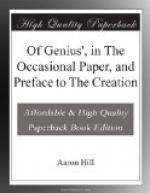... The Muse
so oft her Harp has strung,
That not a Mountain
rears its Head unsung.
But, he adds, in the very next Line, that every shady Thicket too, grows renown’d in Verse; now one can never help remembering, that Thickets are Births, as it were of Yesterday; the mere Infancy of Woods! and that the oldest Woods in Italy may be growing on Foundations of ruin’d Cities, which flourish’d in the Times he there speaks of; whence it must naturally be inferr’d, that to say, the Italian Thickets grow renown’d in Roman Verse, though the Mountains really do so, is to make Use of Words, without Regard to their Meaning; A Lapse of dangerous Consequence, because, when the Understanding is once shock’d, this most rapturous Elevation of the Mind (as when cold Water is thrown suddenly upon boiling) sinks at once to chilling Flatness, and is considered as mere Gingle and childish Amusement.
No Man, I believe, has read without Pleasure, his fine and lively Descriptions of the Nar, Clitumnus, Mincio, and Albula, but the worst of it is, he winds us so long, in and out, between these Rivers, that he loses himself in their Maeanders, and brings us, at last, to a strange Stream indeed, which is ’immortaliz’d in Song,’ and yet ‘lost In Oblivion.’
“I look
for Streams, immortaliz’d, in Song,
Which lost,
and buried in Oblivion lie.”
The Thought, in this Place, is very lively and just, but quite obscur’d by the Redundancy and Wantonness of the Expression. Had he only said ‘lost,’ and ‘buried,’ It might have been urg’d, that the Rivers were dry’d up, and no longer to be found, in their old Channels. But, let them be lost, as to Existence, as certainly as he will, they can never be lost in ‘Oblivion,’ if they are ‘immortaliz’d’ in Poetry. ‘Immortal’ is a favourite Word in this Gentleman’s Writings, and leads him, as most Favourites are apt to do, into very frequent Errors.
It is naturally unpleasant, to be detain’d too long in the Maziness of one tedious Thought, express’d many Ways successively. When we read that the ’Tiber is destitute of Strength,’ what else can we conclude, but that its Stream is a weak one? But we are oblig’d to hear, also, that it ’derives its Source from an unthrifty Urn’: Well, now, may we go on? No; its ‘Urn’ is not only ‘unthrifty,’ but its ‘Source’ is unfruitful. By this time, one can scarce help, enquiring, what new Meaning is convey’d to the Apprehension, by the Multiplication of the Phrases? And not finding any, we have no Reflection to satisfy ourselves with, but, that the strongest Flow of Fancy, is most subject to Whirlpools.
It is from the same unweigh’d Redundancy, and Misapplication of Words, that we so often find this excellent Writer falling into the Anticlimax. As where, for Example, he informs us of Liberty, that she is a Goddess,
“Profuse
of Bliss, and pregnant with Delight,
Eternal
Pleasures, in her Presence reign.”




